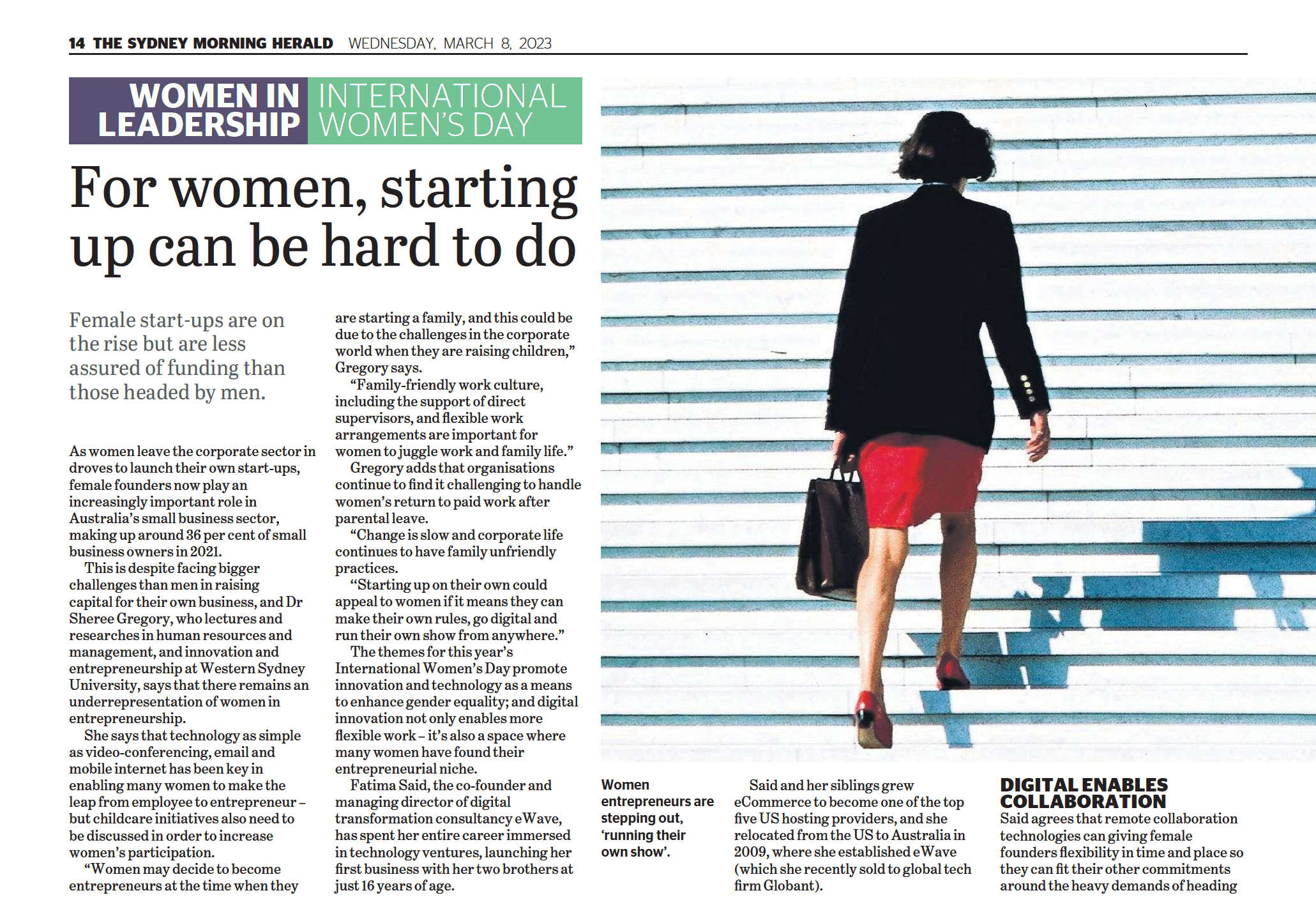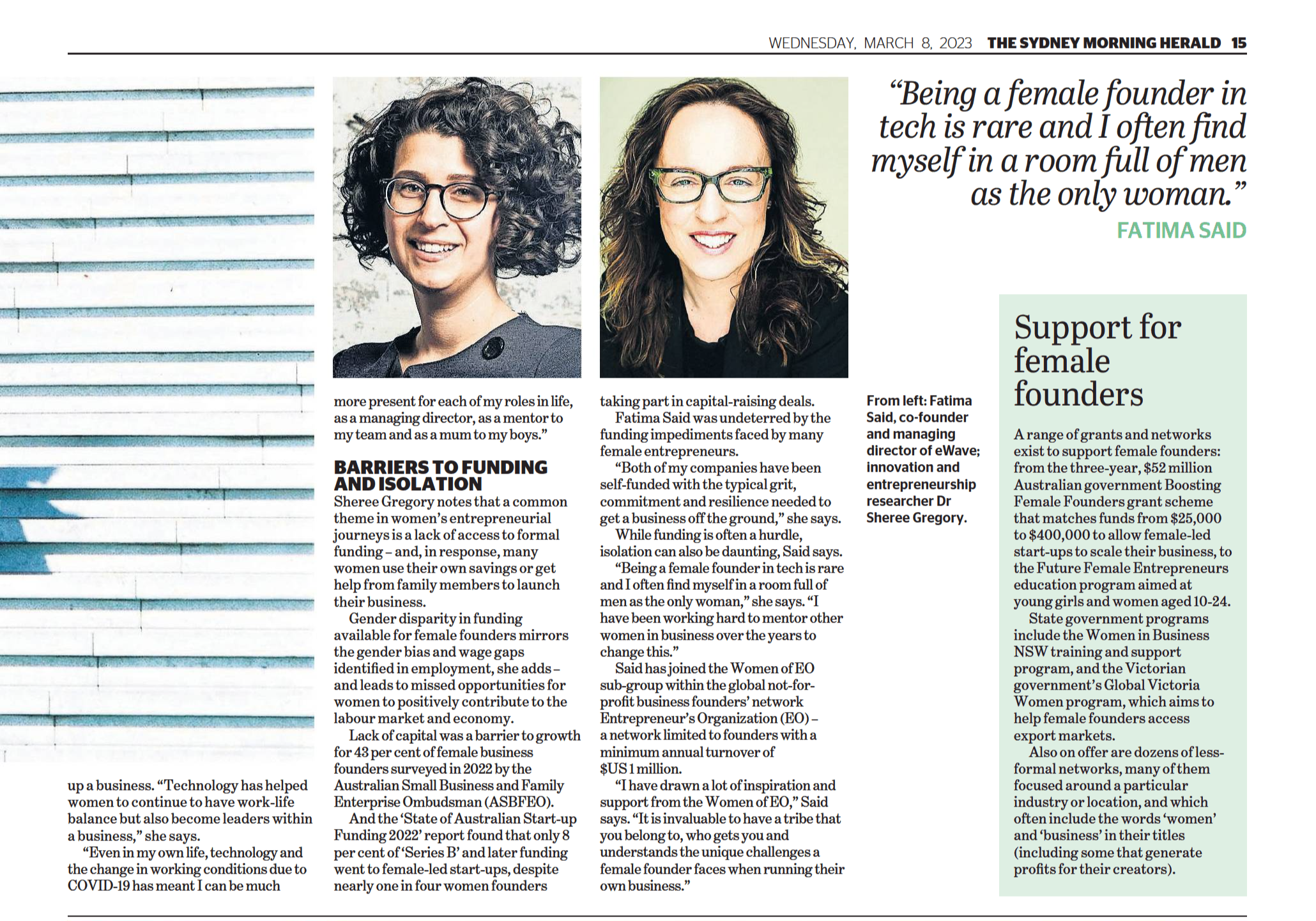Female start-ups are on the rise but are less assured of funding than those headed by men.
As women leave the corporate sector in droves to launch their own start-ups, female founders now play an increasingly important role in Australia’s small business sector, making up around 36 per cent of small business owners in 2021.
This is despite facing bigger challenges than men in raising capital for their own business, and Dr Sheree Gregory, who lectures and researches in human resources and management, and innovation and entrepreneurship at Western Sydney University, says that there remains an underrepresentation of women in entrepreneurship.
She says that technology as simple as video-conferencing, email and mobile internet has been key in enabling many women to make the leap from employee to entrepreneur – but childcare initiatives also need to be discussed in order to increase women’s participation.
“Women may decide to become entrepreneurs at the time when they are starting a family, and this could be due to the challenges in the corporate world when they are raising children,” Gregory says.
“Family-friendly work culture, including the support of direct supervisors, and flexible work arrangements are important for women to juggle work and family life.”
Gregory adds that organisations continue to find it challenging to handle women’s return to paid work after parental leave.
“Change is slow and corporate life continues to have family unfriendly practices.
‘‘Starting up on their own could appeal to women if it means they can make their own rules, go digital and run their own show from anywhere.”
The themes for this year’s International Women’s Day promote innovation and technology as a means to enhance gender equality; and digital innovation not only enables more flexible work – it’s also a space where many women have found their entrepreneurial niche.
Fatima Said, the co-founder and managing director of digital transformation consultancy eWave, has spent her entire career immersed in technology ventures, launching her first business with her two brothers at just 16 years of age.
Said and her siblings grew eCommerce to become one of the top five US hosting providers, and she relocated from the US to Australia in 2009, where she established eWave (which she recently sold to global tech firm Globant).
DIGITAL ENABLES COLLABORATION
Said agrees that remote collaboration technologies can giving female founders flexibility in time and place so they can fit their other commitments around the heavy demands of heading up a business. “Technology has helped women to continue to have work-life balance but also become leaders within a business,” she says.
“Even in my own life, technology and the change in working conditions due to COVID-19 has meant I can be much more present for each of my roles in life, as a managing director, as a mentor to my team and as a mum to my boys.”
BARRIERS TO FUNDING AND ISOLATION
Sheree Gregory notes that a common theme in women’s entrepreneurial journeys is a lack of access to formal funding – and, in response, many women use their own savings or get help from family members to launch their business.
Gender disparity in funding available for female founders mirrors the gender bias and wage gaps identified in employment, she adds – and leads to missed opportunities for women to positively contribute to the labour market and economy.
Lack of capital was a barrier to growth for 43 per cent of female business founders surveyed in 2022 by the Australian Small Business and Family Enterprise Ombudsman (ASBFEO).
And the ‘State of Australian Start-up Funding 2022’ report found that only 8 per cent of ‘Series B’ and later funding went to female-led start-ups, despite nearly one in four women founders taking part in capital-raising deals.
Fatima Said was undeterred by the funding impediments faced by many female entrepreneurs.
“Both of my companies have been self-funded with the typical grit, commitment and resilience needed to get a business off the ground,” she says.
While funding is often a hurdle, isolation can also be daunting, Said says.
“Being a female founder in tech is rare and I often find myself in a room full of men as the only woman,” she says. “I have been working hard to mentor other women in business over the years to change this.”
Said has joined the Women of EO sub-group within the global not-forprofit business founders’ network Entrepreneur’s Organization (EO) – a network limited to founders with a minimum annual turnover of $US 1 million.
“I have drawn a lot of inspiration and support from the Women of EO,” Said says. “It is invaluable to have a tribe that you belong to, who gets you and understands the unique challenges a female founder faces when running their own business.”
- Fran Molloy

